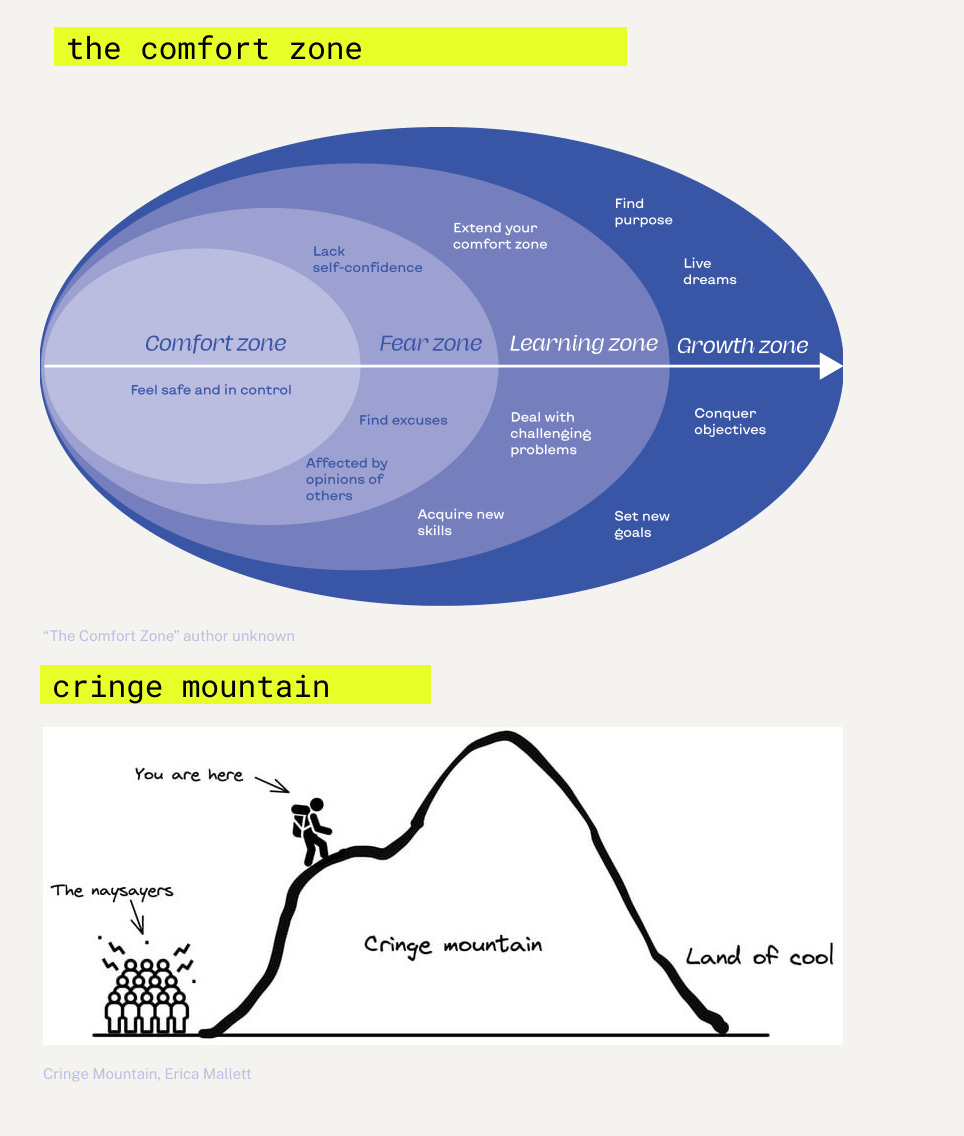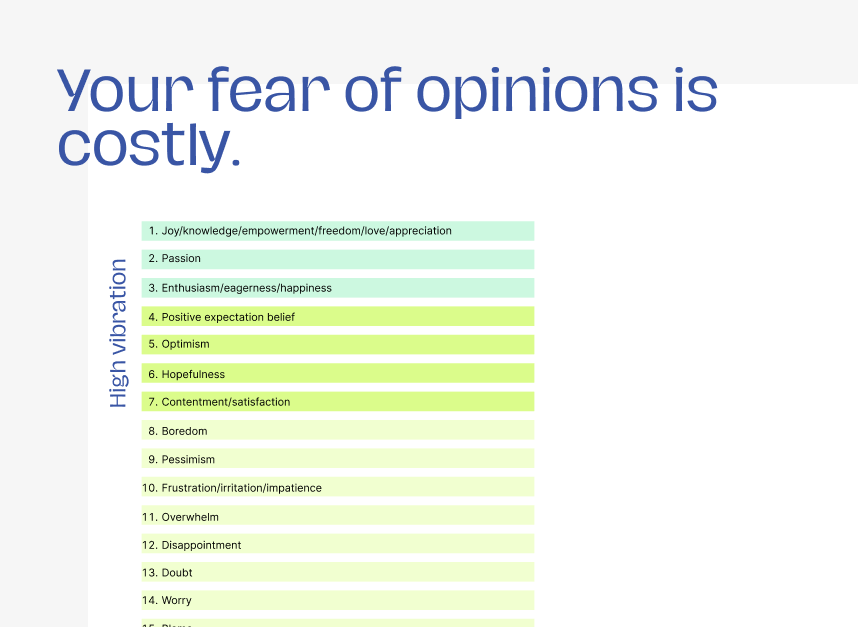Most people feel imposter syndrome at some point. Successful individuals know how to work around it. They don’t allow their mood to shortchange their plan.
When you feel poised for disappointment, do you fight, flight, or freeze? We often learn that success is achieved through pain and discomfort, whether it’s scaling “cringe mountain” or stepping outside the comfort zone.
Often, our immediate reaction to discomfort or cringe is modeled after what we experienced as children.
I recently asked my mom how she dealt with my nasty teenage attitude.
“You do not solve attitude with attitude,” she said. Her patience seemed endless. “A kid having an attitude is trying to find their place in the world, and resolving it doesn’t come through an emotional reaction. Emotional reactions don’t solve problems—anywhere, not just with kids.” She continued, “And what would I have gotten out of an emotional reaction, other than immediate and momentary relief? Seconds of relief, and at a big cost.”
I wasn’t yelled at for mistakes. I wasn’t reprimanded for being too loud, too wild, or too talkative. Certainly not for my looks or how I dressed. Not for how I ate, what I hated, spilling food, making a mess, doing something wrong, or taking too long to figure something out.
Even when I was ill-tempered toward my parents, they never responded with vitriol, anger, or disgust. They might have communicated that my behavior was ineffective, but they never met my dysregulation with more dysregulation.
The impact? I never felt like a disappointment, even when I was. I learned that my behavior was bad—I had disappointed myself. Rather than disappointment becoming my identity because my parents willed it so, I saw my flaws as opportunities to reflect and improve.
The outcome? I was able to reflect when I did something wrong. And I did. I felt the pain of my behavior, unclouded by the rage I might have triggered in a parent’s reaction. I had to sit with myself.
Let’s shift back to imposters.
If you feel like an imposter, you might:
• Agonize over even the smallest mistakes or flaws in your work
• Attribute your success to luck or outside factors
• Be overly sensitive to criticism, even constructive
• Fear being exposed as a phony
• Downplay your expertise, even when you are genuinely more skilled than others
These feelings often lead to self-doubt and self-sabotage.
Psychological wealth is the fast track to self-esteem, confidence, and overcoming imposter syndrome.
How to Handle Imposter Syndrome or Feelings of Inadequacy
When you feel like an imposter, you believe the level of challenge outweighs your skill set. Imposter syndrome reflects a skills gap—or a perceived skills gap. It’s overcome by self-efficacy, the set of beliefs determining how well you can execute a plan of action.
Put simply, self-efficacy is how much you believe you can succeed in a given situation. According to Albert Bandura, who pioneered the concept, there are four sources of self-efficacy:
Mastery experiences. These are performance accomplishments, the most influential source of self-efficacy. Successfully completing a task or overcoming a challenge builds confidence that similar tasks are manageable. Success breeds competence. Each win reinforces belief in your abilities, while failures, especially early on, can weaken it. Learning to ride a bike is a classic example.
Vicarious experiences. This involves observing others succeed—especially those similar to you. Seeing someone else succeed suggests that you can, too, particularly if you share similar backgrounds, challenges, or skills. Per the Kauffman Foundation, children who see entrepreneurs are more likely to become entrepreneurs themselves.
Verbal persuasion. Encouragement and positive feedback boost belief in your abilities. Supportive words from trusted sources—teachers, parents, mentors, or friends—can motivate you to believe in your potential.
Physiological and emotional states. Stress, anxiety, or excitement during tasks can influence self-efficacy. Positive emotions like enthusiasm enhance confidence, while negative emotions like fear can undermine it. Learning to regulate these responses is crucial. For example, feeling calm and focused before a presentation boosts confidence, while nervousness can detract from it.
These sources often interact. A mastery experience can improve emotional states, while verbal persuasion can lead to more mastery experiences. Together, they create a framework for building and maintaining confidence across various areas of life.
Breaking the imposter cycle
Last week I talked about the imposter cycle, or the cycle we fall into when we feel inadequate.
It’s easy to chalk up imposter syndrome to being different in a crowd—and it’s true that women, minorities, BIPOC individuals, and first-generation professionals often feel imposter syndrome more acutely. Systemic issues and biases undoubtedly contribute to these feelings.
But everyone is prone to feeling inadequate at times—so strongly that they feel they don’t belong. Especially those who weren’t raised in environments that enhanced their potential. Take control to change it.
If you liked this post, you might like
Musings: Your fear of opinions is costly
When my 4-year-old recently told me, “Mama, someone said my teeth look big,” my first instinct was to reassure him that being different is okay. I started to say, “We are all made different and—” but stopped myself.











This was my favorite article of yours - I have it bookmarked as I work towards overcoming my own procrastination/avoidance phase of starting my own private practice. Really appreciate the digestible visuals and flowsheets. All the best to you - May amazing opportunities continue to open for you in 2025 and beyond.
Thank you for sharing such powerful insights. It’s amazing how just being aware (or in my case becoming aware :-) of these concepts can help us understand ourselves better and be more intentional in how we support those around us, especially when raising kids. Your mom’s approach was pure gold: “You do not solve attitude with attitude.” That level of patience and perspective—to see a child’s attitude as them figuring out their place in the world, not as something to meet with more emotional reaction—is something we can all learn from. I definitely did. Her wisdom about the cost of emotional reactions really stuck with me. It’s a reminder that parenting (and life) isn’t about quick fixes but about fostering long-term growth.
Albert Bandura’s framework of self-efficacy ties it all together so well. It was so refreshing to learn about the idea that mastery experiences, encouragement, and emotional regulation all feed into each other is such a practical and empowering way to think about confidence. I love how you highlighted that these experiences don’t just stand alone. Rather they build momentum. It’s a great reminder that even small wins and kind words can have a huge ripple effect. Thanks for putting this into words so thoughtfully as it’s this kind of perspective that sticks with you :-)